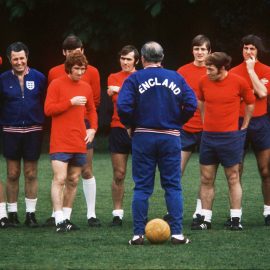Nicotine-stained tyro Jack Wilshere has been provoked to comment on the curious case of Adnan Januzaj. A tiny tiny microcosm of our multicultural world, Januzaj is eligible to play international football for the nations of Belgium (European football’s most fashionable team), Albania, Middle Earth, Turkey, Kosovo, 2004 Disney Classic ‘National Treasure’ and, possibly, England.
This was clearly an issue of imperious importance, and worthy of Wilshere’s expert cultural critique: the disputed territory of whether this 18 year old, who had performed excellently for half an hour in one game and in a clutter of friendlies, would be eligible to play for the English football team at some point towards the end of the decade .Or it may have been whether his friends, or cousins or grandchildren would be qualified. I’m not entirely sure,but irregardless, this tale, which should have been a whispered speculation, was propelled into a discussion by the amplifying echo chamber of a very very quiet news week.
Wilshere’s pronouncements on the subject, burdened with battology, are immensely enlightening:
‘For me, if you are English you are English and you play for England’.
Wilshere’s intervention in the contested realm of identity politics is decisive and definitive; the scruffy urchin seems to believe that he has, quite simply, in his balanced, delicate and equivocal aphorism resolved the argument. So it appear surprising that any quibble remain.
Is this a question of parenthood? In which case, how many parents are required to be English before one is, indeed English? One, two, three? And what of whether one of those parents had been born in England to foreign parents? Those parents had foreign ‘blood’, so their child must have foreign ‘blood’ and in turn their progeny in this sanguinary succession must be of alien ilk.
If one is of dual citizenship, then is one of both nationalities, or neither? Should they instead compete for a compound team of inbetweeners, hybrids and stateless refugees?
Or locus of birth? Are those born south of Hadrian’s Wall, east of Offa’s Dyke and within our coastal bounds universally and definitively English? This seems a tad capricious – if one fell from their mother’s womb the wrong side of the border then one’s sense of identity would be altered irrevocably.
Is there some organic, native English spirit which Januzaj lacks? Some steel or valour of the bulldog? Whatever that may be it is clear that Ashley Young lacks it also.
Is it a qualification on the grounds of speaking English to a sufficient level language? Or completion of a requisite length of schooling within the English schools system? In which case Joe Cole needs to gather his 56 caps into his grubby bindle and post them back to the Football Association.
Would an ‘Englishman’, that is one whom arbiter of nationality Jack Wilshere would accept as English, be committing a heinous treason by representing another country? If Danny Welbeck, Longsight-born and Manchester-schooled, had chosen to play for the land of his parents, Ghana, then would this have been a betrayal?
And if this was a betrayal, then what of a player such as Chris Birchall? In 2005 Port Vale’s answer to David Beckham, a Staffordshire soul whose mother was born in Port of Spain, made his debut for Trinidad and Tobago against Bermuda.
So are they only ‘English’ insofar as they’re useful to the English national team? This seems to be a strangely asymmetrical relationship in which the individual’s sense of binding nationality lapses as soon as the higher ranked FIFA team no longer requires one’s services.
There are numerous possible demonstrative examples from which to test and tease the boundaries of permissible national identity: Ailton and Qatar, Santos and Tunisia, Eduardo and Croatia, Deco and Portugal, or, most obviously, Cris and Hong Kong (notice a common theme in the above?). However, I wish to select another, very recent instance in the game of nationality swapsies:
On 3 October, Athletico Madrid’s ‘Brazilian’ Diego Costa was officially granted Spanish nationality and has since confirmed that he intends to compete, if selected, for Spain in the 2014 World Cup. This is in preference to the country of his birth, Brazil, for whom he has played two friendlies, but which he departed as a 16 year old.
Costa may currently be industrially mining a rich seam of form, but all rational argument seems to suggest that his choice is irrational. For the Spanish national team he faces competition from Villa, Torres, Negredo, Salgado (the latter two are, as far as I can tell, the same player just marketed under different brand names – the Coke and Pepsi of Iberian forwards), or his most prominent competitor: ‘no striker’. For Brazil: Fred….I guess….Does Jo still play football? Has Leandro Damião fallen out of fashion yet? Surely it would be easier to win a place in the Brazilian squad? In fact, Brazil made clear overtures in advance of his decision to attract him to their squad. Yet he chose the much more difficult path, especially when littered with the likely public murmurings in objection to this abrasive South American interloper.
The enhanced joy of triumph a domestically-hosted World Cup is surely an enticement. As would be one’s enriched prospects of his victory. Home sides historically fare very well indeed:
Uruguay (1930)
Italy (1934)
England (1966)
West Germany (1974)
Argentina (1978)
France (1998)
This advantage is lesser than in times of yore, when teams risked dysentery, or their galleons sinking, when voyaging on the journey to foreign climes, but it does remain in some clear sense. To supplement his lower chances of being selected and the reality of missing the opportunity to play in the world’s greatest football tournament in one’s ‘home country’, here is no issue of remuneration here.
Surely it is this decision most lacking in apparent rationality, calculation or gain which reflects the truest sense of national identity. It is one selected and chosen, rather than vaguely inherited. He is Spanish because he feels himself, irrespective of reason, to be Spanish.
This is not a guiding principle which FIFA can apply, no universal prescription of the boundaries of eligibility. Instead it is a surprising suggestion that Jack Wilshere may not have all the answers to the debates of identity politics.
Add Sportslens to your Google News Feed!







